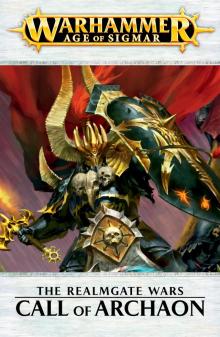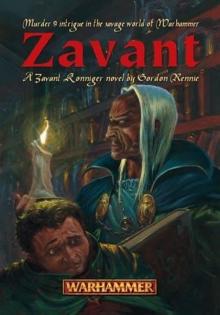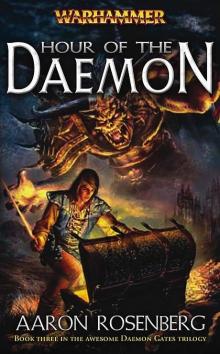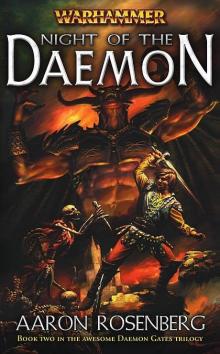- Home
- Black Library
Age of Sigmar: Call of Archaon
Age of Sigmar: Call of Archaon Read online
~ THE AGE OF SIGMAR ~
THE GATES OF AZYR
An Age of Sigmar novel
~ THE REALMGATE WARS ~
WAR STORM
An Age of Sigmar novel
GHAL MARAZ
An Age of Sigmar novel
~ THE BLACK RIFT OF KLAXUS ~
PART ONE: ASSAULT ON THE MANDRAKE BASTION
PART TWO: IN THE WALLS OF URYX
PART THREE: THE GNAWING GATE
PART FOUR: SIX PILLARS
From the maelstrom of a sundered world, the Eight Realms were born. The formless and the divine exploded into life.
Strange, new worlds appeared in the firmament, each one gilded with spirits, gods and men. Noblest of the gods was Sigmar. For years beyond reckoning he illuminated the realms, wreathed in light and majesty as he carved out his reign. His strength was the power of thunder. His wisdom was infinite. Mortal and immortal alike kneeled before his lofty throne. Great empires rose and, for a while, treachery was banished. Sigmar claimed the land and sky as his own and ruled over a glorious age of myth.
But cruelty is tenacious. As had been foreseen, the great alliance of gods and men tore itself apart. Myth and legend crumbled into Chaos. Darkness flooded the realms. Torture, slavery and fear replaced the glory that came before. Sigmar turned his back on the mortal kingdoms, disgusted by their fate. He fixed his gaze instead on the remains of the world he had lost long ago, brooding over its charred core, searching endlessly for a sign of hope. And then, in the dark heat of his rage, he caught a glimpse of something magnificent. He pictured a weapon born of the heavens. A beacon powerful enough to pierce the endless night. An army hewn from everything he had lost.
Sigmar set his artisans to work and for long ages they toiled, striving to harness the power of the stars. As Sigmar’s great work neared completion, he turned back to the realms and saw that the dominion of Chaos was almost complete. The hour for vengeance had come. Finally, with lightning blazing across his brow, he stepped forth to unleash his creations.
The Age of Sigmar had begun.
I
‘You come to me offering death,’ said Copsys Bule, stabbing his long-handled trident into the soft red soil. Blood or something distantly akin to it oozed lazily up around the sinking tines. ‘A kingly gift, envoy, but death flourishes where I choose to sow it. I am a harvester of death.’
Kletch Scabclaw studied him with eyes that could have gleaned weakness from diamond. They were milk yellow, and glared over the mangy scrap of man-skin that he held pressed to his muzzle in the claws from which he had taken his name. The look on his furry, verminous face might have been one of disgust, though at what, or who, was something the plague priest kept for himself.
‘A new age begins, they squeak-say.’ Spreading his paws, the skaven irritably swatted aside a buzzing bloat fly. Through Bule’s blurred vision it appeared to have three eyes, until the ratman snapped his claws and his vision once again became clear. ‘War comes. Even to you.’
Bule snapped his head up.
The skaven immediately backed up a pace, hunched for fight or flight. Light on his foot-paws, he stood atop the rotten mush that went up to Bule’s greaves. His right paw had gone for the weapon he concealed beneath his robes, and he hissed a warning through his scented rag.
Bule smiled, rotten flesh yielding to produce something too wide for a human mouth.
Slowly, Kletch held up his empty paws, then the gnawed-on nub of his tail. It switched over the ratman’s head with irritation. ‘I did not come-scurry all way from clan-burrow to fight-quarrel. The Black Thumb and Clan Rikkit were friend-allies in the Age of Chaos. Is written. Is remembered. Now we must-need fight tooth to claw again.’
Bule turned his back with a mild shake of the head. Withdrawing his bloodied trident, he stabbed three new aeration holes into the soil, the tines spearing an inch deep before hitting something unyielding. Baring the black stubs of his teeth he gave a grunt of pleasure, planted his foot to the back of the fork-head, and rocked back and forth on the handle.
Levering the trident against his bloated girth, he turned over the unyielding patch in a waft of decomposing flesh.
The human corpse tore off its blanket of topsoil and flopped over. A face that was grey-black and runny and lovely as a crop of sweet tubers fresh out of the ground stared up at the slow circling stars with the clarity of the dead. Disturbed maggots and worms squirmed under the starlight, as if divulging some great secret under torture. Bule watched them re-bury themselves, lulled by the drone of a billion bloat flies and the rank cackle of crows.
Wriggle. Wriggle.
‘Rotbringer,’ the skaven prompted him.
Bule pinched his eyes wetly, mind asquirm with worms and portent. The ratman continued.
‘The lightning men hit clan-burrows in Cripple Fang, Untamed Lands and Putris Bog. Even clan-cousins from far Ghyran come-flee, tunnelling the realm-places to bring word of war.’
Shouldering his trident, Bule turned around suddenly enough to elicit a low squeal of alarm from the plague priest of Clan Rikkit. The ratman leapt to one side, reaching again for his concealed weapon, but Bule merely squelched through the spot he had been occupying as though he were a zombie suddenly impelled to be elsewhere.
‘Bule. Bule!’
Copsys Bule ignored him, his armour emitting a mould-muffled clank with every step. Several of the spiked plates were split apart at the joins, but the damage to his armour had been inflicted not from without but from within. Corpse gasses distended his belly, opening up the plates from the inside like a fat grub eating its way out of an egg sac. Everywhere there remained living skin, swellings, boils and tumours caused further buckling, mottling the once-green metal to black.
Not since before the Age of Chaos had Bule known an equal, and his gardens brought weeping harvest to lands from the Bloodbloom Fields in the south to the Avalundic Ice Kingdoms in the north, from the peat bogs of Murgid Fein to the unconquerable Rabid Heights and their gargant kings.
His demesne was too vast for one name.
It encompassed the Pox Sands, the great Bloat Lake and the Plantation of Flies – fleshwork patches stitched with irrigation ditches that steamed with blight and hummed with spawning daemonflies. As far into the bubonic haze as the eye could see, scrofulous, once-human things tilled the soil with rakes and hoes, or waded into pools with long prods to turn the bloated corpses that floated in them, gestating towards ripeness. Hundreds expired in the time it took Bule to walk past them, and were dragged away to the nurseries to replenish the soil in their turn.
But it was the nature of lesser beings to attach small names to great things.
They called it the Corpse Marshes.
Seemingly at random, feeling where the dead desired his knife, he squatted down into the mire. A sigh of simple pleasure escaped him. The crucified remains of men, women and children staked the ground in serried rows for a stretch greater than a man could ride in a day. Here could be found the bodies of almost every race, including several that no longer existed anywhere but as they did here now. For reasons fathomable to few but Bule himself, he called it his Living Orchard. A foetid breeze moaned through the dead, making them hum and sway, like lush-leaved trees in bloom. Drawing a curved knife from his arming belt, he sawed away a hand that liquefaction was beginning to pull away from the wrist. It was human. A nectarine blackness trickled from the cut. He licked it from his hand, eyes closed in ecstasy.
There was no plan in his mind of how his garden should be, but he knew what needed to be done towards its completion. And it would be soon. V
ery soon.
The thought thrilled him even as the part of him that had cherished these labours was saddened by their imminent passing.
‘There are a great many of your kind here,’ Bule said, aware that the ratman had followed him and was now crouching on an old wall behind him. Keeping his distance. ‘Your fur. Your guts. You teem with life like no other.’ He cut away another sagging limb with a clinical slash. ‘Nothing rots as quickly as a skaven rots. Nothing embraces Grandfather Nurgle so completely.’
‘Is that what you want-wish me to take back to my masters?’
‘Ask me again come the high moon.’
‘Why-why? What changes then?’
Bule licked his knife with a wide smile. Birds cried in fevered tongues, a diseased animal sagacity that he might one day have the fortune to fathom but half of. ‘You come on an auspicious night. For the first time in thousands of years the stars will align my realmgate with another.’
‘And then?’ Kletch hissed, suddenly wary.
‘Ask me again come the high moon.’
II
Fistula, First Blightlord of the Black Thumb, delighter in sickness and death, opened the orruk from hip to hip with a sawing reverse of his blade. A surprised snort issued from the greenskin’s tusked helmet, but the fighter remained upright, tough as necrotic flesh and just as dead to pain. Holding its squirming guts in a fist the size of a buckler, it swung its axe at the blightlord with a roar.
Hardwearing, vicious – orruks were infamous. But the fever spreading fire through its veins from the infected belly wound made it sluggish. Fistula sidestepped the clumsy slash with ease then broke its shin with a heel jab. It was sweating. Most men would never know that an orruk could suffer the way this one now did. But still it would not yield.
Fistula appreciated that.
Dashing aside its weakening backslash on the flat of his sword, he stepped in behind its flailing trunk of an arm, close enough to smell the daemon plaguelings rampaging through its veins, then plunged his parrying dagger through its throat.
The orruk’s mammoth jaws snapped spasmodically as Fistula tore his dagger loose and kicked the brute away. Blood from the torn artery sprayed in a rising arc and painted the open face of Fistula’s helm green. He gasped. Partly to drink the wetness from the air. Partly for the raw pleasure of doing so.
Fistula looked down on the beaten orruk. It was still snapping its jaws even as it drowned in its fluids and its eyes turned white. Fistula could have ended it quickly, should have, perhaps, but endemic as the orruks were in the shadow of the Rabid Heights there were never enough to last. He looked up.
The orruks were still fighting in scattered mobs spread out along the length of the narrow gulch into which the Black Thumb had pursued them, but they were broken. Not in the manner of a human or Rotbringer host. They did not run. Rather, they held on with the witless tenacity of sick beasts. Hardy as they were as a race, all bore the stigmata of infection: weeping sores and crusted cuts that would not heal. For every hundred that lay dead with an obvious wound, a hundred more twitched on the ground with blood foam in their mouths and flies on their rotting flesh.
Gors and bestigors plunged headlong into the fray, hacking and goring with frenzied abandon. Rotbringer knights on maggot-riddled steeds galloped up the steeply climbing wall of the gulch to strike at the orruk warleader. The huge beast was surrounded by his biggest and most brutal, but was already heavily beset by the Tzeentchian warhost driving in from the opposite side of the ravine.
The Changeling host was a cacophonous legion of colours and shapes. Gold glittered. Strange voices whispered. Flames of every cast, smell and texture danced along the crossbars of banner poles, and suits of almost-sentient armour whispered secrets to the deepest subconscious of all nearby with a mind to hear. Daemonflies buzzed over everything and everyone. Blight hounds ran along the flanks, pulling down the isolated and the maimed. Giant slugs burrowed up from under the hardpan to swallow Tzeentchian warriors whole while plague drones and sleek daemonic screamers swept at each other in pitched battle for the skies.
The orruks had become almost incidental.
Fistula read the kindred mood in his opposite number, the hunger, coming from somewhere out there in the gulch. They had both come to torment prey, but now, starved of a true challenge, they threw their warriors at the other with greater ferocity than they had ever before.
It was something that Copsys Bule had become too fat and old to realise. Even the most rapacious of plagues could be tamed, lingering only on the scraps left by those they had once devastated in their millions.
A stamp of hellsteel and an ebullient cry called Fistula back from the abstract of the battle. Through a congested melee of putrid blightkings and sickening orruk fighters half again their size, a Chaos warrior encased in full plate armour of azure and gold barged towards him. His helm was solid metal, with only the etching of half-lidded eyes through which some enchantment perhaps permitted him to see. From the sides, golden horns spiralled inwards towards infinity. The Tzeentchian knuckled aside an orruk and roared the final strides with his broadsword swept high overhead.
With a shout, Fistula pivoted on the spot and smacked his saw-toothed blade hard into the larger blade’s descent. It was not a parry. He struck the Tzeentchian’s broadsword as though meaning to do it harm. The impact arced up his arm. He felt it vibrate in his teeth. Reflex action shocked his fingers open and would have lost him his blade if not for the blood and pus that pooled endlessly into his grip from infected calluses and glued palm to hilt.
The Tzeentchian reeled as though it had been struck on the head by a blow that had left its helmet ringing. Its heavy sword trailed, elbows locked in spasm with the aftershock of keeping a hold of his blade.
Fistula struck off the warrior’s head with a single blow to the neck and laughed.
He was the opposite of Copsys Bule in most ways. Where the Lord of Plagues had become a bloated wreck of a man, Fistula’s body was wasted, the favour in which he was held written in lesions on pared bone and in the ropey musculature that seeped and seeped without end. He was a warrior. A fever raged in his mind that no level of war could ever purge and his armour, lighter by preference, was etched with tallies of the blights he had tasted and the civilizations he had brought low.
‘Secure the dead,’ bellowed a cadaverous, jaundiced blightking wearing a cruel harness of scythe-edged plates and hanging mail. He lay into the orruks with a pair of matching knives, bloodily proficient in his preferred mode of killing. Fistula was one of the few to know him as Vitane. To most, he was Leech. The blightking turned and waved a come now gesture. ‘Bring up the wagons. If we are not back by high moon it will go poorly for you.’
Rattling in under a fug of disease came a dozen wagons. Each was drawn by a team of six wheezing horses, their loose wheels the size of a man, their high sides scratched with the knife marks of individual warriors and with a splintered parapet of aged wood. Leprous harvesters in hoods and swaddling leaned over the parapet with hooks to draw up the dead. The drovers called a halt. The horses snuffled in their traces, hacking, puking, biting at each other’s flea-ravaged coats.
Fighting his way to Fistula’s side, Vitane looked down on the orruk still dying at his lord’s feet. The leathery tissue was continuing to shrivel away, the liquidised remainder sinking around the bones.
‘He will be unhappy. This one is worthless.’
Fistula sneered. Vitane was old enough to have fought with Copsys Bule from the beginning, lacking enough in ambition or favour to prevent his star being eclipsed by the man he now followed into battle.
‘I am not here to scavenge and I am not here for Bule,’ Fistula said.
They could not all dine off glories past.
Fistula scanned the confusion for the Tzeentchian champion. Warriors of every stripe filled the gulch from wall to wall with a riot of colour an
d noise. Even the sky reflected the vivid clash, the bubonic haze that blanketed Bule’s demesnes turned a sickly turquoise by the rolling cumulus of Tzeentchian fire that followed the war horde from the north. Twisted trees covered in naked sores and weeping black foliage clung to the ridgeline. They swayed under the opposing winds.
Fistula shivered though he could not say why. His eyes narrowed.
There was something there, hidden under the drooping canopy. Fistula glimpsed a figure, or the suggestion of one. More a feeling than something he could later describe and claim with certainty had been real. He perceived a sense of robes, of a gaunt, skeletal height, but his overriding impression was one of watchfulness, of many, many sets of eyes trained upon every aspect of this moment in time. In a blink of the mind it was gone. The inkling of its prior being was a subliminal glamour that nevertheless refused to fully fade, as though he had gazed overlong upon a daemon and imprinted its corona of power onto his mind.
He shook his head, and with the blessed release of a peeled scab pulled off his helmet and wiped the orruk’s gore from his hairless scalp.
The sense of watchfulness remained on him, a nagging question at the back of his mind. He felt judgement, though for what, Fistula doubted he had the faculties to comprehend. Nor did he care. He bared his teeth in anticipation and raised his sword to signal the charge. His own glorification was all that mattered.
Let it watch. Let it judge.
III
Kletch Scabclaw spread his arms out to either side while a skavenslave hung the heavy ambassadorial cloak of Clan Rikkit over his shoulders. It was a bit much for the cloying humidity of the Corpse Marshes, and itched in hard-to-reach places that no garment so august should. Its fleas had been passed from priest to priest for two hundred years, and were now the hardy descendents of those that had survived the clan’s full arsenal of pesticidal sorcery.
His dresser ducked under his arm and shuffled around to the front.

 Age of Sigmar: Call of Archaon
Age of Sigmar: Call of Archaon Zavant
Zavant Daemon Gates Trilogy
Daemon Gates Trilogy Daemon Gates Trilogy 02 Night of the Daemon
Daemon Gates Trilogy 02 Night of the Daemon